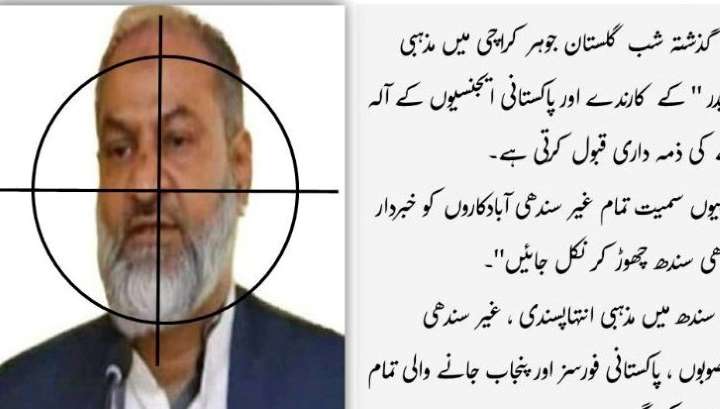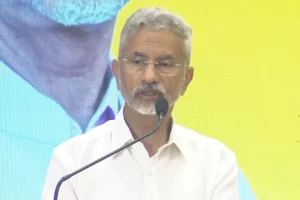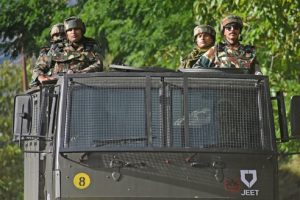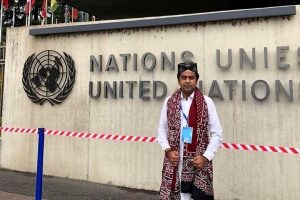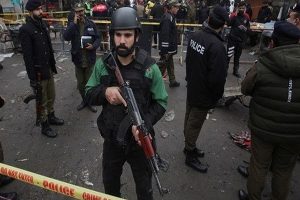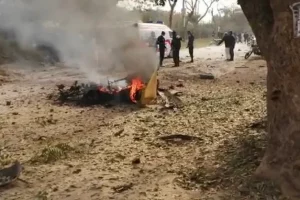Pakistan is investigating the killing of “educationist Syed Khalid Raza” and former commander of Kashmiri terror outfit Al Badr who was shot dead by a single bullet aimed at his head on Sunday.
Investigators have labelled it a “targeted killing” and have indicated that a foreign hand could be behind the killing. They are also investigating whether the Sindhi nationalist outfit – the Sindhudesh Revolutionary Army (SRA), which claimed responsibility for the killing, is behind the murder.
The fatal attack on Raza comes just one week after a Hizbul Mujahideen terrorist was killed in Rawalpindi – the Pakistani Army headquarters- in similar circumstances.
Sindhudesh Revolutionary Army (SRA), an ally of #Baloch militant alliance #BRAS, claims responsibility of killing Khalid Raza, an educationist and a former member of Al Badr jihadi outfit, in Gulistan Johar, #Karachi.
SRA warns all Punjabis and non-Sindhis to leave #Sindh. pic.twitter.com/FgV4Q983jH— SAMRI (@SAMRIReports) February 27, 2023
The SRA, which is fighting for an independent Sindh, has carried out recurring attacks in Sindh but has only a handful of big-ticket attacks unlike the Baloch insurgents who work with impunity. The Sindhi rebel organisations are known for small-scale attacks like blowing up train tracks, damaging mobile communication towers and bombing power transmission lines.
In September 2022, the SRA carried out an attack on a Chinese dental clinic in Karachi in which Ronald Raymond Chou was killed and Dr Richard Hu and his wife Phen Teyin were severely wounded. Though China denied immediately that the people were not Chinese nationals, the news made international headlines.
In another attack in Karachi in May 2022, the SRA targeted a vehicle belonging to the Pakistani Coast Guard in which one person was killed and 13 injured. Even as the Coast Guard personnel escaped injuries, a large number of vehicles were damaged.
It is widely believed that the Sindhi separatists have honed their skills courtesy Baloch insurgents.
In 2020 four Baloch outfits joined hands with the SRA to create an umbrella organisation—Baloch Raji Ajoi Sangar (BRAS) with the aim of opposing the China Pakistan Economic Corridor (CPEC). Like the Baloch nationalists, many Sindhis too believe that the CPEC is exploiting local people to benefit Pakistan’s Punjab-dominated areas and China.
The alliance helps the Sindhi outfits get training in warfare while they provide logistical support to Baloch fighters to carry out their operations in Karachi and other parts of Sindh.
WHAT A HELL GOING ON IN SINDH ?#SindhuDesh#VideoViral pic.twitter.com/jYO5rlmAg0
— Karachi Ki Awaz ® (@Karachi_Update) January 20, 2023
Pakistan’s policies are making it easy for the rebel groups to operate in Sindh. Increasingly, the Sindhi people have been voicing their dissatisfaction with the Pakistani government over settling Afghan migrants and other ethnicities in Sindh, which they say is leading to crime against the locals and usurpation of their land.
Their other grievances include the exploitation of Sindh natural resources like water, to benefit Punjab province. A major complaint is the enforced disappearances of the Sindhi political leaders. In January 2023, violence erupted after the police opened fire on Sindh nationalists who had gathered to celebrate the 119th birth anniversary of nationalist leader GM Syed in Jamshoro. The event had been organised by a number of relatives of GM Syed as well as nationalist organisations.
The SRA might be smaller and less lethal as compared to Baloch groups but it has already made a dent in Pakistan-China relations. If its claim about the killing of the Al Badr commander is indeed true then it might have arrived on the insurgency scene with a bang that will surely make the Pakistani establishment extremely uncomfortable.
Also read: Sindhis protest over illegal migration and enforced disappearances






